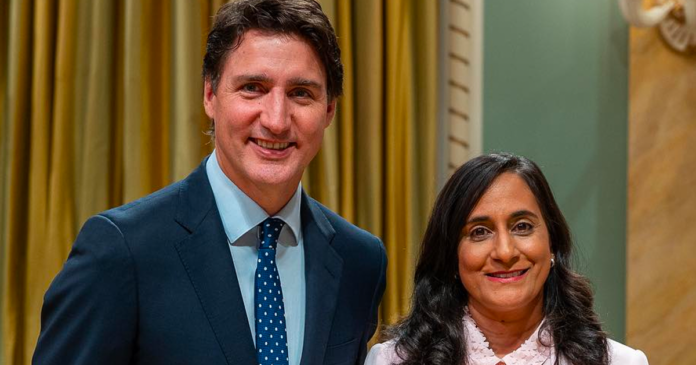Minister of Transport and International Trade Anita Anand says that Canadians will just have to “bear the sacrifice” of the Trudeau government’s so-called “Team Canada” approach to U.S. President Donald Trump’s threat of imposing 25% tariffs.
“We will use all tools in our toolbox to address any illegal tariffs that come forward and that should not just be one province alone,” Anand told CBC News Tuesday. “All of us need to bear the sacrifice that would be made if we move forward with retaliatory measures of this sort.”
Anand went on to say “Canada has vast natural resources and raw materials and we need to diversify our markets going forward so that we ourselves are leveraging the depth of our natural resource sector.”
Trump has confirmed that the tariffs could take effect as early as Feb. 1.
“There are no winners in a trade war, as every tariff levied reduces prosperity and standards of living on both sides of the border,” Renaud Brossard, vice president of Communications at the Montreal Economic Institute told True North.
“Every tariff levied is essentially a tax on those who consume or transform the targeted goods into further manufactured parts, ultimately contributing to an increase in the cost of living.”
Renaud’s understanding of what a trade war with the U.S. might look like for Canadians has not been lost on certain premiers either.
Despite the Trudeau government’s branding of its “Team Canada” approach to retaliatory measures, dissent has been brewing among the premiers, which began with Alberta Premier Danielle Smith.
After being the only premier of 13 to refuse to sign a joint statement on Canada-U.S. relations, it now appears she has some support from Saskatchewan Premier Scott Moe and Premier François Legault in Quebec.
Legault said any retaliatory action involving energy exports south of the border should first require the approval of provinces and those most affected earlier this week.
“Regarding energy, I think it is important that if it affects a province, that this province has to give its consent first,” said Legault during a caucus retreat in St-Sauveur, Que.
Moe echoed this sentiment by saying that his province was “most certainly not supportive of export tariffs” and that his government intended to “ensure that an export tariff couldn’t be applied on Saskatchewan products.”
According to Renaud, imposing retaliatory tariffs will only guarantee that “Canadians would see higher prices and a drop in product availability in stores, which is a concerning thought as families are still feeling the effect of the recent inflationary wave.”
“If Ottawa is intent on retaliating to U.S. tariffs on a dollar-for-dollar basis, it’ll find out that we’ll run out of an economy much faster than our U.S. counterparts do,” he said.
